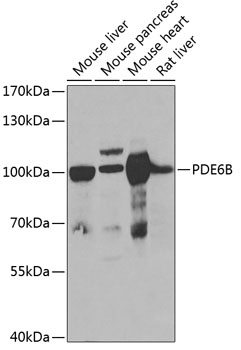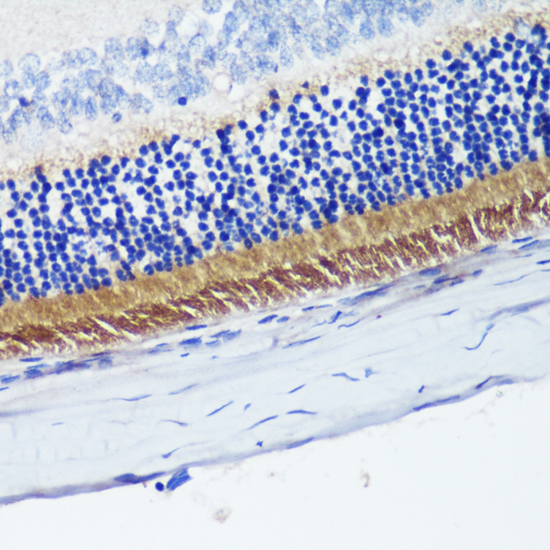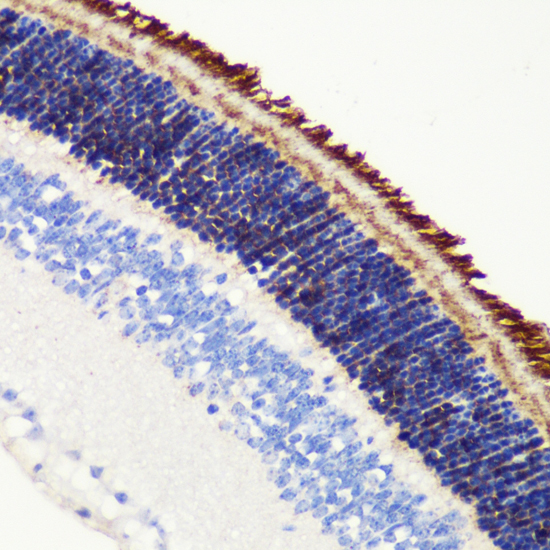Signal Transduction Antibodies 3
Anti-PDE6B Antibody (CAB6942)
- SKU:
- CAB6942
- Product Type:
- Antibody
- Reactivity:
- Human
- Reactivity:
- Mouse
- Reactivity:
- Rat
- Host Species:
- Rabbit
- Isotype:
- IgG
- Antibody Type:
- Polyclonal Antibody
- Research Area:
- Signal Transduction
Description
| Antibody Name: | Anti-PDE6B Antibody |
| Antibody SKU: | CAB6942 |
| Antibody Size: | 20uL, 50uL, 100uL |
| Application: | WB IHC IF |
| Reactivity: | Human, Mouse, Rat |
| Host Species: | Rabbit |
| Immunogen: | Recombinant fusion protein containing a sequence corresponding to amino acids 1-190 of human PDE6B (NP_001138763.1). |
| Application: | WB IHC IF |
| Recommended Dilution: | WB 1:500 - 1:2000 IHC 1:50 - 1:100 IF 1:50 - 1:100 |
| Reactivity: | Human, Mouse, Rat |
| Positive Samples: | Mouse liver, Mouse pancreas, Mouse heart, Rat liver |
| Immunogen: | Recombinant fusion protein containing a sequence corresponding to amino acids 1-190 of human PDE6B (NP_001138763.1). |
| Purification Method: | Affinity purification |
| Storage Buffer: | Store at -20'C. Avoid freeze / thaw cycles. Buffer: PBS with 0.02% sodium azide, 50% glycerol, pH7.3. |
| Isotype: | IgG |
| Sequence: | MSLS EEQA RSFL DQNP DFAR QYFG KKLS PENV AAAC EDGC PPDC DSLR DLCQ VEES TALL ELVQ DMQE SINM ERVV FKVL RRLC TLLQ ADRC SLFM YRQR NGVA ELAT RLFS VQPD SVLE DCLV PPDS EIVF PLDI GVVG HVAQ TKKM VNVE DVAE CPHF SSFA DELT DYKT KNML ATPI MNGK DVVA VI |
| Gene ID: | 5158 |
| Uniprot: | P35913 |
| Cellular Location: | Lipid-anchor, Membrane |
| Calculated MW: | 66kDa/98kDa |
| Observed MW: | 98kDa |
| Synonyms: | PDE6B, CSNB3, CSNBAD2, PDEB, RP40, rd1, GMP-PDEbeta |
| Background: | Photon absorption triggers a signaling cascade in rod photoreceptors that activates cGMP phosphodiesterase (PDE), resulting in the rapid hydrolysis of cGMP, closure of cGMP-gated cation channels, and hyperpolarization of the cell. PDE is a peripheral membrane heterotrimeric enzyme made up of alpha, beta, and gamma subunits. This gene encodes the beta subunit. Mutations in this gene result in retinitis pigmentosa and autosomal dominant congenital stationary night blindness. Multiple transcript variants encoding different isoforms have been found for this gene. |
| UniProt Protein Function: | PDE6B: This protein participates in processes of transmission and amplification of the visual signal. Necessary for the formation of a functional phosphodiesterase holoenzyme. Defects in PDE6B are the cause of retinitis pigmentosa type 40 (RP40). RP40 is a retinal dystrophy belonging to the group of pigmentary retinopathies. Retinitis pigmentosa is characterized by retinal pigment deposits visible on fundus examination and primary loss of rod photoreceptor cells followed by secondary loss of cone photoreceptors. Patients typically have night vision blindness and loss of midperipheral visual field. As their condition progresses, they lose their far peripheral visual field and eventually central vision as well. Defects in PDE6B are a cause of congenital stationary night blindness autosomal dominant type 2 (CSNBAD2); also known as congenital stationary night blindness Rambusch type. Congenital stationary night blindness is a non-progressive retinal disorder characterized by impaired night vision. Belongs to the cyclic nucleotide phosphodiesterase family. 2 isoforms of the human protein are produced by alternative splicing. |
| UniProt Protein Details: | Protein type:Phosphodiesterase; EC 3.1.4.35 Chromosomal Location of Human Ortholog: 4p16.3 Cellular Component: plasma membrane Molecular Function:3',5'-cyclic-GMP phosphodiesterase activity; metal ion binding Biological Process: cytosolic calcium ion homeostasis; GMP metabolic process; phototransduction, visible light; regulation of rhodopsin mediated signaling; retina development in camera-type eye; rhodopsin mediated signaling; visual perception; Wnt receptor signaling pathway, calcium modulating pathway Disease: Night Blindness, Congenital Stationary, Autosomal Dominant 2; Retinitis Pigmentosa 40 |
| NCBI Summary: | Photon absorption triggers a signaling cascade in rod photoreceptors that activates cGMP phosphodiesterase (PDE), resulting in the rapid hydrolysis of cGMP, closure of cGMP-gated cation channels, and hyperpolarization of the cell. PDE is a peripheral membrane heterotrimeric enzyme made up of alpha, beta, and gamma subunits. This gene encodes the beta subunit. Mutations in this gene result in retinitis pigmentosa and autosomal dominant congenital stationary night blindness. Multiple transcript variants encoding different isoforms have been found for this gene. [provided by RefSeq, Feb 2009] |
| UniProt Code: | P35913 |
| NCBI GenInfo Identifier: | 226693550 |
| NCBI Gene ID: | 5158 |
| NCBI Accession: | P35913.2 |
| UniProt Secondary Accession: | P35913,Q53XN5, Q9BWH5, Q9UD49, B7Z9T9, E7ETT3, |
| UniProt Related Accession: | P35913 |
| Molecular Weight: | 66,494 Da |
| NCBI Full Name: | Rod cGMP-specific 3',5'-cyclic phosphodiesterase subunit beta |
| NCBI Synonym Full Names: | phosphodiesterase 6B |
| NCBI Official Symbol: | PDE6B |
| NCBI Official Synonym Symbols: | rd1; PDEB; RP40; CSNB3; CSNBAD2 |
| NCBI Protein Information: | rod cGMP-specific 3',5'-cyclic phosphodiesterase subunit beta |
| UniProt Protein Name: | Rod cGMP-specific 3',5'-cyclic phosphodiesterase subunit beta |
| Protein Family: | cGMP-specific 3',5'-cyclic phosphodiesterase |
| UniProt Gene Name: | PDE6B |
| UniProt Entry Name: | PDE6B_HUMAN |
View AllClose









